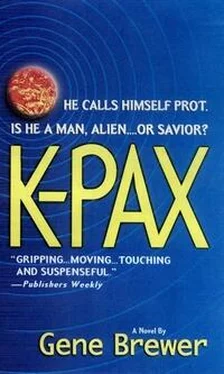"On K-PAX, everyone is a teacher. If you have a question, you just ask whoever is around. And of course there are the libraries."
"Libraries? Who runs the libraries?"
"Gene, gene, gene. No one does. Everyone does."
"Are these libraries structures we Earth people would recognize?"
"Probably. There are books there. But many other things as well. Things you would not recognize or understand."
"Where are these libraries? Does each city have one?"
"Yes, but our 'cities' are more like what you would call `villages.' We have no vast metropolises such as the one in which we are presently located."
"Does K-PAX have a capital?"
"No"
"How do you get from one village to another? Are there trains? Cars? Airplanes?"
A deep sigh was followed by some incoherent mumbling in a language I couldn't understand (later identified as "pax-o"). He made another entry in his notebook: "I've already explained this, gino. We get from place to place on the energy of light. Why do you find this concept so hard to understand? Is it too simple for you?"
We had been over this before and, with time running out, I did not intend to be sidetracked again. "One final question. You have said that your childhood was a happy one. Did you have other children to play with?"
"Hardly any. There are very few children anywhere on K-PAX, as I have indicated. Besides that, there is no distinction between 'work' and 'play' on our PLANET. On EARTH, children are encouraged to play all the time. This is because you believe they should remain innocent of their approaching adulthood, for as long as possible, apparently because the latter is so distasteful. On K-PAX, children and adults are all part of the same thing. On our PLANET life is fun, and interesting. There is no need for mindless games, either for children or adults. No need for escape into soap operas, football, alcohol, or other drugs. Did I have a happy childhood on K-PAX? Of course. And a happy adulthood as well."
I didn't know whether to feel gladdened or saddened by this cheerful answer. On the one hand, the man seemed genuinely content with his imaginary lot. On the other, it was obvious he was denying not only his family, but his school experiences, his childhood itself. Even his country. Everything. Every aspect of his entire life, which must have been quite abominable, indeed. I felt a great deal of pity for this young man.I ended the interview with a question about his "home town," but this also led nowhere. K-PAXians seemed to drift from place to place like nomads.
I dismissed the patient and he returned to his ward. I had been so astonished by his utter denial of everything human that I forgot to call the orderlies to go with him.
After he had gone I returned to my adjacent office and went through his entire file again. I had never experienced a case like this, one for which I couldn't seem to find any kind of handle. Only one other in thirty years was even close, and it also involved an amnesiac. A student of mine was eventually able to trace the man's roots through an analysis of his reawakened interest in sports-but it took a couple of years.
I jotted down what I had on prot so far:
1. P hates his parents-had he been abused?
2. P hates his job, the government, perhaps society as a whole-had there been a legal problem resulting in a perceived injustice?
3. Did something happen 4-5 yrs ago that underlay all these apparent hatreds?
4. On top of everything else, the patient has a severe sex hangup.
As I looked over these notes I remembered something that my colleague Klaus Villers has professed on more than one occasion: Extraordinary cases require extraordinary measures. I was thinking of the rare instances in which a delusional of exceptional intelligence has been convinced that his identity was false. The most famous example of this treatment is the one in which a well-known comedian graciously consented to confront a delusional look-alike, and a miraculous cure was quickly effected (but not before they both put on quite a show, evidently). If I could prove to prot that he was, in fact, an ordinary human being and not some alien from another planet ...
I decided to do a more thorough physical and mental workup on him. I was particularly interested in learning whether he was, in fact, abnormally sensitive to light, as he claimed to be. I also wanted to have the results of an aptitude test and to determine the extent of his general knowledge, particularly in the areas of physics and astronomy. The more we knew about his background, the easier it would be to find out who he really was.
WHEN I was a senior in high school our career counselor advised me to take the one course in physics our school offered. I quickly' learned that I had no aptitude for the subject, though the experience did serve to increase my respect for anyone who could master that esoteric material, among them my wife-to-be.
We were next-door neighbors from the day she was born, Karen and I, and we played together all the time. Every morning I would go outside and find her in the yard, smiling and ready for anything. One of the fondest memories I have is of our first day in school, of sitting behind her where I could smell her hair, of walking home with her and leaves burning. Of course we weren't really sweethearts at that age-not until we were twelve, the year my father died.
It happened in the middle of the night. My mother came and got me up because she hoped, vainly as it turned out, that I might be able to do something. When I ran into their bedroom I found him lying on his back, naked, sweating, his pajamas on the floor beside the bed. He was still breathing, but his face was ashen. I had spent enough time in his office and on hospital rounds to suspect what had happened and to recognize the seriousness of the situation. If he had taught me something about closed-chest massage I might have been able to help him, but this was before CPR was generally known and there was nothing I could do except watch him gasp his last breath and expire. Of course I yelled at my mother to call an ambulance, but it was far too late by the time it got there. In the meantime I studied his body with horrible fascination, his graying hands and feet, his knobby knees, his large, dark genitalia. Mother came running back just as I was covering him with the sheet. There was no need to tell her. She knew. Oh, she knew.
Afterwards, I found myself in a state of profound shock and confusion. Not because I loved him, but because I didn't-had almost wished him dead, in fact, so I wouldn't have to become a doctor like him. Ironically, because of the tremendous sense of guilt I felt, I vowed to go into medicine anyway.
At the funeral, Karen, without anyone saying anything, sat beside me and held my hand. It was as though she understood perfectly what I was going through. I squeezed hers too, hard. It was unbelievably soft and warm. I didn't feel any less guilty, but with her hand in mine it seemed as though I might be able to get through life somehow. And I've been holding it ever since.
ON Friday of that week we received a visitor from the State Board of Health. His job is to check our facilities periodically, see that the patients are clean and properly fed, that the plumbing works, etc. Although he had been here many times before, we gave him the usual grand tour: the kitchen, the dining and laundry and furnace rooms, the shop, the grounds, the recreation/exercise room, the quiet room, the medical facilities and, finally, the wards.
It was in the rec room that we found prot sitting at a card table with two of my other patients. I thought that a bit odd inasmuch as one of them, whom I shall call Ernie, almost always keeps to himself, or talks quietly with Russell, our unofficial chaplain. The other, Howie, is usually too busy to talk to anyone (the white rabbit syndrome). Both Ernie and Howie have been here for years, sharing the same room, and both are very difficult cases.
Читать дальше










